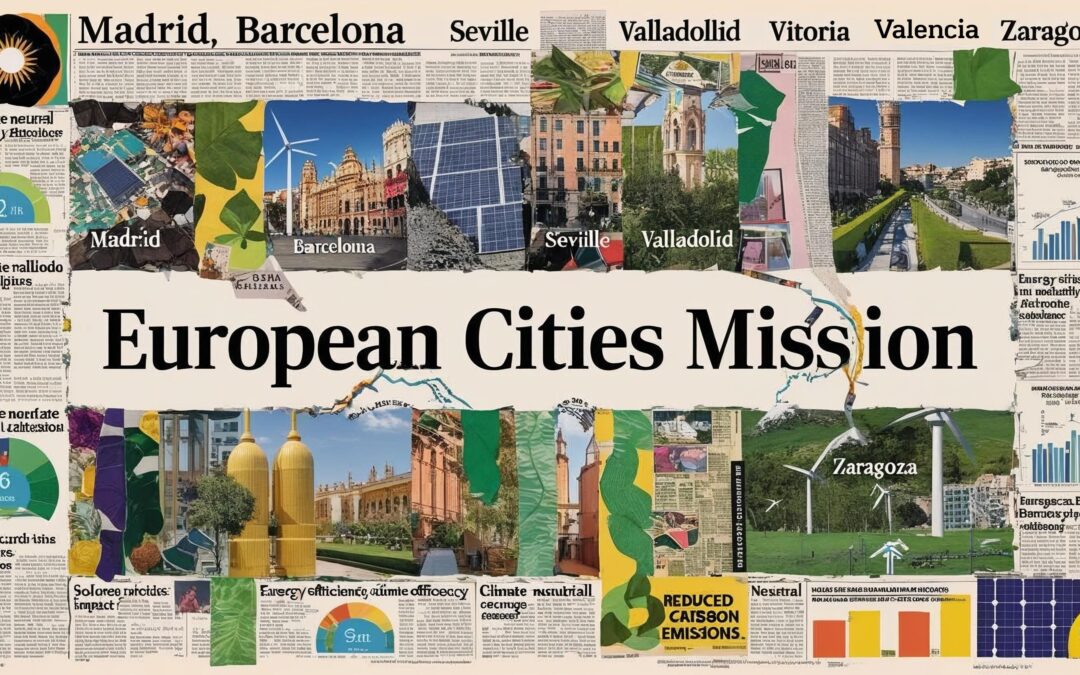In 2022, the European Commision launched one of its most ambitious initiatives: the Smart and Climate Neutral Cities Mission for 2030. In this mission, 112 cities were selected from among 377 candidates to lead the transition to climate neutrality and achieve it by 2030, 20 years before the global target set for the entire continent in the European Green Pact. Among them are 7 Spanish cities: Madrid, Barcelona, Valencia, Seville, Valladolid, Vitoria and Zaragoza.
The Mission introduced a results-oriented logic, with the Climate City Contracts (CCC) as a central tool to articulate three pillars necessary to achieve this transformation: political commitment, technical roadmap and integrated financial mechanisms.

“The Climate City Contracts (CCC) are voluntary agreements between cities and the European Commision that looks for collaborate to address the challenges of climate change at the local level”
Three years after its launch, and in the context of the recent Mission Conference1 “Building on Cities´Successes: Driving Climate Action for 2030”; held in Vilnius (Lithuania) from May 6-8, which served as a key meeting point for mission cities, their technology partnerts and the European Commision, it is timely to review progress. From CARTIF, as an active partner in several projects linked to the Mission, we have closely experienced this evolution from the initial vision to the current implementations that we can summarize by taking a look at the mission projects in which we work:
NETZEROCITIES (GA 101036519), platform that supports the implementation of the mission, acts as its methodological backbone, providing technical assistance, support to the “pioneer cities” and the development of tools for urban innovation (several designed and developed by CARTIF as technological partner of the project) that are helping to consolidate a common approach for all participating cities, beyond individual projects. In this context, it also highlights the role of CapaCITIES (GA 101056927), of which CARTIF is also part, and which acts as a catalyst to strengthen the institutional, technical and of governance capacities of the cities, replicating the concept of mission implementation platform in national contexts.
In NEUTRALPATH (GA 101096753), project coordinated by CARTIF, we are working with Zaragoza and Dresden to develop Positive Energy Districts (PEDs), capable of producing more energy than they consume as one of the main elements to improve energy efficiency, reduce emissions and therefore achieve climate neutrality. This transformation requires integrated solutions in energy efficiency, renewable energy, storage, digitalization and citizen participation. The project is demonstrating that the neighbourhood scale approach can be not only viable, but replicable, and key to reaching urban climate neutrality.
In ASCEND (GA 101096571) , where CARTIF participates as a partner, we collaborate with the cities of Lyon and Munich in the accelerated demonstration of integrated and scalable urban solutions, also associated with the concept of Positive Energy Districts (PED). Our role focuses on the design of climate impact planning and monitoring tools, enabling cities to make informed and adaptive decisions. ASCEND seeks not only to test technologies, but to orchestrate them in real urban ecosystems, with the ambition to scale.
Finally, in MOBILITIES FOR EU (GA 101139666), coordinated by CARTIF, we collaborate with Madrid and Dresden to demonstrate electric and autonomous mobility solutions, connected to renewable energy infrastructure and smart urban grids such as advanced 5G systems. Our approach combines technology, systemic analysis and business models to accelerate the adoption of clean solutions for mobility of people and goods.
The Vilnius conference has highlighted that the Mission is no longer a promise, but a network of cities in full transformation. From CARTIF, at the forefront of the implementation of the mission, we reaffirm our commitment to this vision: to put innovation at the service of cities and businesses to make them more sustainable, fair and resilient.

These projects are funded by the Horizon Europe research and innovation program.
1 Cities Mission Conference “Harnessing City Successes: Advancing Climate Action for 2030”
- From ambition to action: the evolution of the European Cities Mission - 16 May 2025
- Sustainable Mobility Plans, a key element for the decarbonisation of our cities - 15 September 2023
- We say goodbye to mySMARTLife - 6 January 2023




